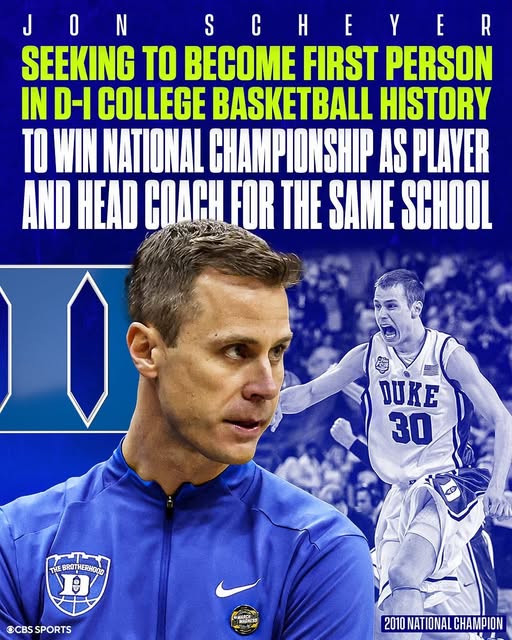Jon Scheyer has a chance at history with Duke in order to carve out his own legacy in one of college basketball’s most storied programs. The opportunity before him is not just about maintaining the success of the Blue Devils, but about transcending the immense shadow cast by the legendary Mike Krzyzewski, whom Scheyer played under and later served as an assistant coach. With the responsibility of leading Duke into the next era, Scheyer stands at the crossroads of history, with the potential to redefine the program while upholding its prestigious traditions.
A Historic Transition
When Jon Scheyer was named Duke’s head coach in 2022, the move marked the end of an era under Coach K and the beginning of a new chapter for the Blue Devils. Few programs in college basketball have experienced such a seamless transition of power, but for Scheyer, the challenge is significant. Taking over for one of the greatest coaches in the history of the sport comes with immense pressure, both from the public and internally within the program. However, his deep ties to the program, including his experience as a player, assistant coach, and the respect he commands, give him a unique advantage in his quest to lead Duke to even greater heights.
For Duke to maintain its reputation as a powerhouse in college basketball, Scheyer must continue the legacy of dominance that Coach K built over four decades. Under Krzyzewski, Duke won five national championships, made 12 Final Four appearances, and consistently recruited the best talent in the country. The bar has been set incredibly high, and the question that many are asking is whether Scheyer can not only meet but exceed these expectations.
Building on a Legacy
Jon Scheyer’s tenure as a player at Duke gives him an edge that many first-time head coaches don’t have when they take over at a top program. Scheyer was an integral part of the Blue Devils’ 2010 national championship team, serving as the team’s leader and one of the key contributors throughout the tournament. His experience playing under Coach K provided him with invaluable insight into the program’s culture, philosophy, and expectations. He understands the intricate balance of maintaining the winning tradition while evolving to meet the demands of the modern college basketball landscape.
One of the key components of Scheyer’s challenge is finding a way to honor the past while pushing the program forward. Duke basketball is built on a foundation of high standards, not just on the court but off it as well. The Blue Devils have consistently attracted some of the best players in the country, and Scheyer will need to ensure that the program’s reputation for developing elite talent remains intact. This means continuing to recruit players who are not only skilled but also possess the character and discipline that has defined Duke basketball for decades.
At the same time, Scheyer must also adapt to the changing landscape of college basketball, particularly in light of the NCAA’s evolving rules around NIL (Name, Image, Likeness) and the transfer portal. These new factors have altered the recruiting process and player movement in college sports, and Duke must remain competitive in these areas if it is to continue attracting top-tier talent.
Scheyer’s Coaching Philosophy
Scheyer’s approach to coaching is deeply influenced by the time he spent under Coach K’s tutelage. However, while he shares many of the same values and principles, Scheyer’s style is uniquely his own. His basketball philosophy revolves around a few key tenets: teamwork, discipline, and adaptability. These principles were core to Coach K’s success, and Scheyer has embraced them while adding his own emphasis on innovation and player empowerment.
One area where Scheyer has already shown his ability to innovate is in the way he incorporates analytics and technology into his coaching. The game of basketball has evolved rapidly over the past few years, and Scheyer understands the importance of staying ahead of the curve. By leveraging advanced statistics and data-driven insights, he can better prepare his players for the complexities of modern basketball. Whether it’s optimizing offensive and defensive schemes or maximizing player performance, Scheyer is embracing the future of the game while still staying true to the fundamental aspects of Duke basketball.
Scheyer has also emphasized the importance of player development, both on and off the court. While Duke has long been known for attracting top-tier recruits, Scheyer understands that it’s not enough just to bring in high-profile players. Developing these players into well-rounded individuals who excel in all areas of the game is crucial for long-term success. Under his leadership, the Blue Devils are focused on creating a culture of accountability, growth, and selflessness that will be essential to building sustained success.
The Challenges Ahead
Although Scheyer’s potential for success at Duke is vast, the challenges he faces are equally significant. One of the biggest hurdles for any new coach at a program with the history and expectations of Duke is the immense pressure to win. The Blue Devils have been a perennial contender in college basketball, and anything less than a national championship or deep tournament run is often seen as a disappointment.
To make matters more complicated, Duke is part of one of the most competitive conferences in college basketball, the ACC. With programs like North Carolina, Syracuse, and Virginia constantly vying for supremacy, Scheyer will need to prove that he can not only compete in the ACC but dominate it in the same way that Coach K did for so many years. This will require the ability to recruit at the highest level, manage in-game strategy, and cultivate a culture that breeds success on and off the court.
Additionally, Scheyer must navigate the evolving dynamics of college basketball, particularly with the influence of NIL deals and the transfer portal. These new factors have changed the way programs build rosters, and Duke must remain nimble and responsive to these shifts. Scheyer has already shown a willingness to embrace these changes, but the reality is that the landscape of college sports is constantly shifting, and the ability to adapt will be crucial to Duke’s continued success.
Scheyer’s Impact on Duke’s Future
Looking beyond the immediate challenges, Jon Scheyer’s leadership could have a profound impact on the future of Duke basketball. If he can guide the program to another national championship or consistently compete for titles, he will cement his place as one of the greatest coaches in the history of college basketball. Moreover, if he can lead Duke through this new era of college basketball and maintain the program’s excellence, Scheyer will solidify his legacy as a coach who not only followed in the footsteps of Coach K but also built something enduring and unique in his own right.
Another critical aspect of Scheyer’s future is the influence he will have on the next generation of players. Just as Coach K had a profound impact on players like Grant Hill, Christian Laettner, and Zion Williamson, Scheyer has the opportunity to shape the careers of future NBA stars. His ability to develop players, both on the court and as people, will be key to the program’s continued success. Beyond the X’s and O’s, it is Scheyer’s leadership and mentorship that will help Duke players grow into not just better basketball players, but better individuals.



